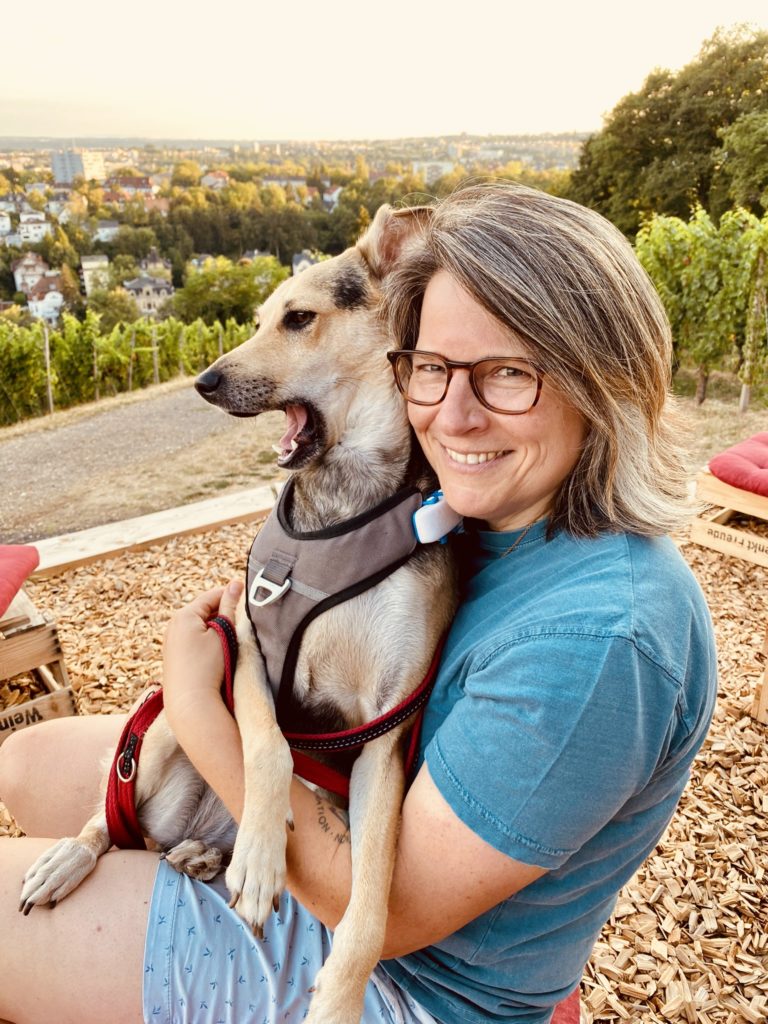Lesbian activist for 25 years DANIELA ZYSK, now works for Ylva Publishing as its Finance and Diversity Manager. Here, she talks about the surprising discoveries she’s made about herself thanks to menopause.
If you’re around me these days, you can’t avoid a subject I love to talk about: menopause, also known as the climacteric. I’m not a gynecologist, but I’ll give you a quick summary anyway.
Menopause is the hormonal change in one’s ovaries and uterus that marks the end of fertility. It begins with perimenopause, the first symptoms of which can appear from one’s late 30s. It ends with postmenopause, 12 months after the last menstrual period.
Menopause itself refers only to the last menstrual period and is only a very small part of the menopause experience.
The symptoms of menopause
At 47 years old, I’m now in the middle of perimenopause, with all its pleasant and not-so-pleasant side effects.
It really started for me in my early 40s, when I was at the peak of my physical fitness. After a ten-hour day at work, I would easily jog 12 kilometers in the evening to train for a half-marathon in the Himalayas. (Today, the mere thought of it exhausts me, and I collapse on the sofa for a nap).
But even though I was fit as a fiddle, I was beginning to show signs of menopause. There was the rosacea — radical skin changes that I could only control with an antibiotic ointment. I will probably have to use it for the rest of my life.
Rosacea is a common condition sparked by menopause because it can be linked to hormonal changes. My dermatologist hadn’t told me about it, and I probably wouldn’t have believed him either. I still felt a hundred years away from menopause.
Five years since I began experiencing the onset of menopause, the symptoms are undeniable for me.
Of course, not every woman has a problem with menopause. A third don’t notice anything, a third have mild symptoms (I would count myself among them), and a third have symptoms that are severe.
A few months ago, I asked my female gynecologist for a blood test to check my hormone levels. She was not at all enthusiastic about it.
Hormone pills—made from mare’s urine, among other things—used to be handed out like Smarties by doctors in the nineties. A study in 2002 put a quick end to this when numerous side effects became public knowledge. But ever since then, many gynecologists have shied away from the subject of menopause like the Devil from holy water.
Fortunately, the blood test I took showed no abnormalities, just that I was in menopause.
Mourning the loss of sugar and flour
My biggest problem was a sudden intolerance to sugar and white flour. I have almost always eaten a healthy and balanced diet and have been a vegan for ten years. Nevertheless, I began to experience symptoms such as heart palpitations, severe joint pain, headaches and acute fatigue.
Fortunately, I quickly noticed that the symptoms increased when I ate too many of my beloved pretzels or snacked on vegan chocolate. After a very bad period, I decided to reduce my sugar and white flour intake as much as possible.
My physical performance is not as good as it was five years ago, but I do feel like doing sport again without writhing in pain. Also, for the time being, the heart problems are a thing of the past.
And since we are just among ourselves here… my libido, which had briefly gone into hibernation, has also returned to my life.
Menopause and lesbians

What makes menopause different for me as a lesbian? Physically, probably not much, because the symptoms can be as varied as there are women in the world.
Some people might say that I have it easier as a childless woman. I can use my dwindling energy much more purposefully than my heterosexual friends who have to cope with two or three adolescent kids—on top of a job, a household, and a husband in midlife crisis.
Losing my fertility isn’t an issue for me either, and I certainly don’t have to worry about whether I’m still attractive to men as the wrinkles get deeper and the body puts on weight in one place or the other.
Although the lesbian community has become much more youth oriented in recent years, gray hair is still considered sexy. This is a fact that I only really became aware of when I finally admitted having gray hair over two years ago — and have been wearing it proudly ever since. Since then, I’ve been getting attention especially from younger lesbians.
I have always been very liberated about my sexuality and my body. But during menopause, this became even more pronounced. It’s as if my mind is telling me, “You’ve got nothing to lose now. Let’s get the party started!”
The age-gap appeal—myth or reality?
While men who find older women sexy are criticized, it is the rule rather than the exception for young lesbians to find older women really desirable, even if we don’t all look like Cate Blanchett.
I know what I’m talking about: I was one of those young lesbians. And there’s the indisputable fact that sapphic books about age-gap couples are among Ylva Publishing’s bestsellers.
What else has changed for me?
Basically, my bullshit radar has become more sensitive, and it’s much easier for me to distance myself from people or issues.
I have less need to please other people because I’ve realized that I’m halfway through my life and I want to live the next few years as autonomously as possible. I am in a much better position than other women because I am financially independent and have made good provision for my retirement.
To sum up, I can say that coming out as a “menopausal lesbian” is the start of a completely new phase in my life. It involves many risks, especially physical ones, but it also gives me the chance to live my life with unprecedented clarity because the fog has lifted and I can not only see my needs much more clearly but also articulate them.
And I intend to make the most of it. Towanda!


Thanks!!
It really help to understand myself better going through this menopause.